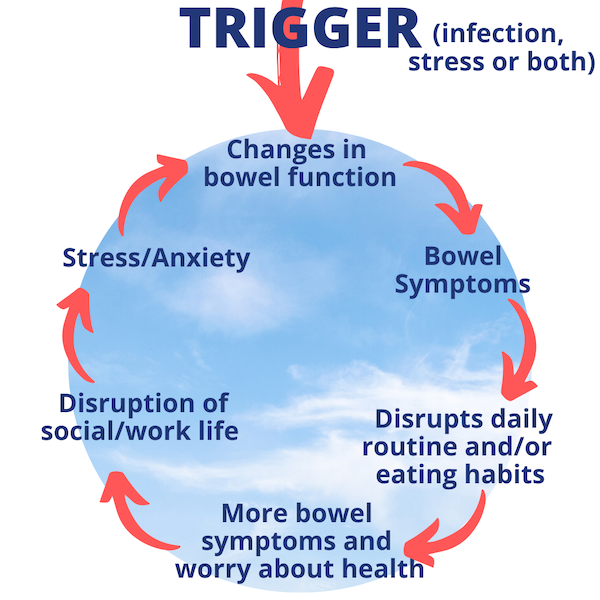A recent worldwide study has revealed that there is a close link between having irritable bowel syndrome and common mental health conditions such as anxiety and depression.
The research, which included over 40 institutions across the UK and Spain examined nearly 50,000 patients with IBS and found that IBS symptoms are caused by the same biological processes as anxiety1.
This of course seems to make sense as there is an overlap in the symptoms of both anxiety and IBS including gastrointestinal disturbances, avoiding social situations, feeling panicked and embarrassment.
The link between Stress and IBS
Irritable bowel syndrome has long been connected to our mental wellbeing with stress being a well known trigger. It is often described as a vicious cycle as high levels of stress can trigger IBS symptoms (also known as stress induced IBS) but then having IBS symptoms can lead to high levels of stress, anxiety and depression.

The above image describes the vicious circle of anxiety and how a trigger – which might be a traumatic life event, infection or even both – can lead to changes in your bowel function. This can go on to cause bowel symptoms and changes to daily routines or eating habits as you try to cope. The concerns, which can be substantial, then start to disrupt our work or social lives, and then anxiety or depression can creep in.
The IBS Network have a useful factsheet about Stress, Trauma and IBS which puts this into context, which you can download from their website- this is also listed at the end of this article2.
If this resonates with you, the good news is that there is help available to help manage your symptoms and stress.
Martha Highton of NHS IAPT (Improving Access to Psychological Therapies) tells us:
Many symptoms of panic disorder and IBS are similar including avoidance of social situations, embarrassment and the overwhelming need to leave certain environments. Our minds and stomachs are strongly linked, meaning that often if there is an issue with one it often will affect the other.
Similarly if people are suffering with problems relating to their bowel or bladders, this will often cause symptoms of anxiety or depression.
There is help.
NHS IAPT (Improving Access to Psychological Therapies) service that can offer a range of therapies including CBT (Cognitive Behavioural therapy), counselling and digital therapy. The best therapy for you will depend on your situation.
This service is accessible throughout the UK, it is FREE and you can self-refer from the NHS website.
If you think that you could benefit from help to manage your anxiety/ depression and your symptoms of IBS then you can get in touch with IAPT through the NHS website.
You can also find online support for your bladder or bowel conditions from the Bladder and Bowel Community where you can find information to help you manage your condition. We have a closed Facebook group with thousands of members who all understand what it’s like to live with a bladder or bowel condition. Join today.
